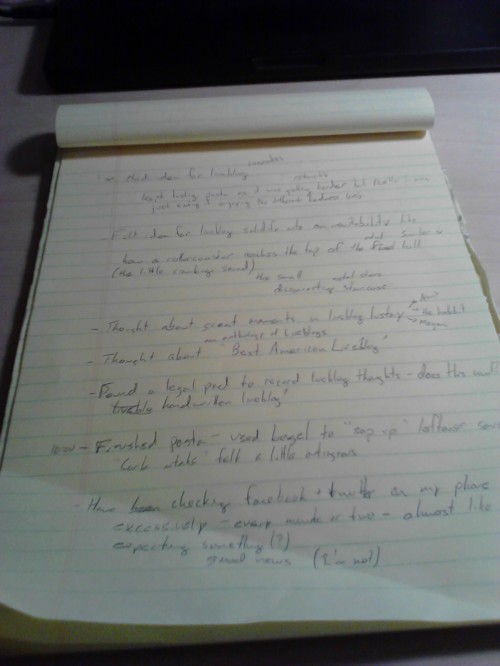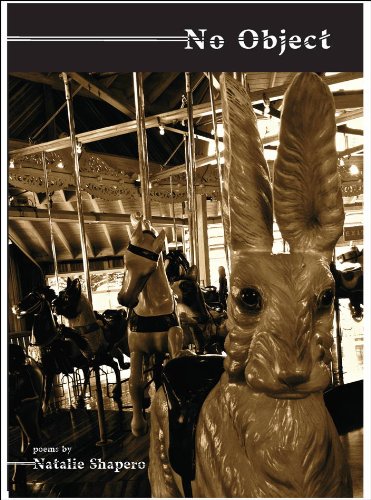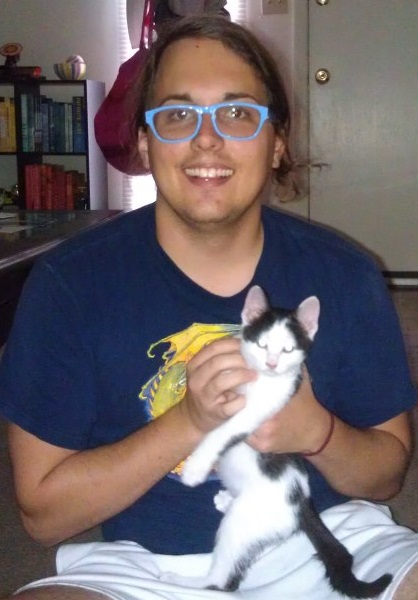Liveblogging a liveblog
~9:30pm: Had idea for liveblog in kitchen.
~9:35pm: Am making pasta. Roommates all ate dinner before me and left, no one to talk about liveblog with.
9:37pm: Ostensibly checking noodles for appropriate firmness, but really I’m just eating wet noodles.
9:43pm: Felt idea for liveblog solidify into an inevitability, similar to how a rollercoaster reaches the top of its initial hill and goes over (the little cranking sound, the disconcerting staircase)
9:45pm: Thought about great moments in liveblogging history: AWP 2011, The Hobbit, Megan Boyle
9:46pm: Thought about an anthology of liveblogs — “Best American Liveblogs”
9:50pm: Began recording liveblog thoughts on a legal pad — does this count? Handwritten liveblog?
Here Lies a Fuck Ton of Poets Whose Names Were Writ in Water…
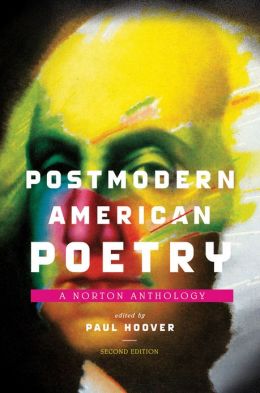
I feel like it would be an honor to be left out of an anthology as much as it would be to be included in one (Ange Mlinko’s review of Paul Hoover’s Norton Anthology of Post Modern Literature from the Nation, follows. I expect this will get taken down soon, as the original article was behind a paywall…). Do you give a fuck about this? Or about being anthologized? Should I?
Dumb Stuttering Free by Atticus Davis
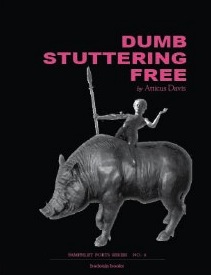 Dumb Stuttering Free
Dumb Stuttering Free
by Atticus Davis
Bedouin Books, 2012
65 pages / $7 Buy from Amazon or Bedouin Books
I picked it up because of the cover, really. There’s a billion images you come across in a bookstore and as Americans crawl out of the cover of their baseball caps and 501’s, they also are getting slightly better at attention to detail when it comes to other types of design. While pink and black usually reminds me of a mall goth wearing an angry bunnies t-shirt I saw this and was hypnotized by it’s sleek design and composition. It felt like picking up a Void record and when I realized it was letterpress I was kind of turned on.
I cracked it open, this thick but fun-sized pocket reader, and was shocked to realize that this wasn’t your typical San Francisco ‘artisanal’ or ‘handmade curiosity-’read; the ones guiltlessly banished to the cesspool-ashbin of hack art marketed as the ‘alternative economy.’ D.I.Y. in the most neurotic and psychologically defensive fashion ever; where stick figures are accepted in the visual medium and illegible eyeball burning cut and paste zines are the truest of literature. The first page of Dumb Stuttering Free is like taking a straight shot of cheap whiskey with no chaser, but instead of that shitty sick-to-your stomach, corn-gut regret after, you down the next 62 pages like it’s a Mexican Coca Cola [ the ones with cane sugar], every page smoother than the last. It completely consumes you, it’s hidden passion in composition so cold and methodical you have to pinch yourself to make sure you’re really there.
They say when you’re falling asleep, the physical sensation of limbs starts to disappear as you enter the hypnagogic state—that’s how it feels. It was like coffee and pot at the same time, except I’m sober, and there’s no sounds, and I still have enough control of my nerves to clearly jot Atticus’ name into a notebook to Google later because I’m imagining he’s been as widely published as Vera Pavlova.
April 5th, 2013 / 12:00 pm
The Small Press Book Review
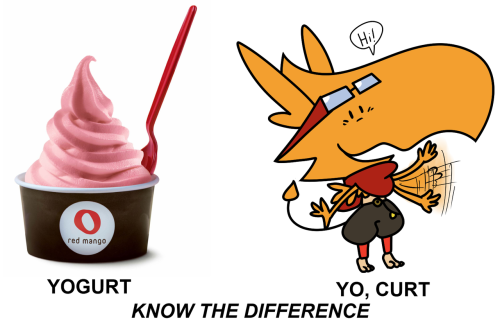 The beautiful lumberjack Mel Bosworth—with Christy “Peach Cinnamon” Crutchfield—has started a terrific archive of small press reviews from over the years, with new ones to come, elegantly called The Small Press Book Review. The blog is retro and easy to navigate, and the reviews are clear and concise. A great new resource if you’re curious about some of those books you’ve heard about but haven’t yet plucked.
The beautiful lumberjack Mel Bosworth—with Christy “Peach Cinnamon” Crutchfield—has started a terrific archive of small press reviews from over the years, with new ones to come, elegantly called The Small Press Book Review. The blog is retro and easy to navigate, and the reviews are clear and concise. A great new resource if you’re curious about some of those books you’ve heard about but haven’t yet plucked.
25 Points: Antwerp
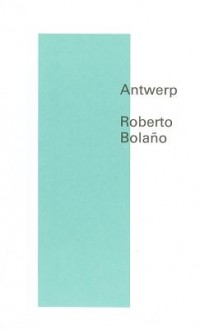 Antwerp
Antwerp
by Roberto Bolaño
New Directions, 2012
96 pages / $9.95 buy from Amazon
1. I wouldn’t say that this is the big bang of Bolaño’s fictional universe. I would say that it’s a baby fictional universe growing in the black hole of another baby fictional universe growing in the black hole of another baby fictional universe growing in the black hole.
2. This book has a lot of quotations without identified speakers. Without particularized mouths. As in how do we know who’s speaking or what it means to claim possession of a speech act. As in how do we know what’s Tupac and what’s a hologram of Tupac.
3. It’s like if I were to say to my computer, “say banana” and it said “banana,” and if this went on for a while with me saying words and my computer repeating them, until eventually I wrote down only my computer’s part of the exchange and made a novella out of it. Except that instead of saying banana I would say things like
“ The evening light dismantles our sense of the wind.”
4. Machines that move you. People in cars and trains, racing across highways and fields, going nowhere fast, towards a multiplicity of voided horizons.
5. Once I had a dream that was also a film I was directing where the main character kept experiencing acute disassociation from her body every time she got on an airplane or into a car, etc, and in the dream I (as the director and actress of the film) kept feeling the words “I’m not here.” I wish I could describe the torture of that feeling besides just calling it singular and unforgettable. Similar to the feeling of watching the movie Inception in the middle seat of an airplane flying over the ocean. Also, the feeling of reading this book, in certain moments.
6. There’s someone writing a story, the one you’re reading, and as the words are being written they’re simultaneously being picked up and examined by the characters in the story, or they’re splattering onto the car windshield of the man driving across the desert, who every few minutes catches himself looking down at his wrist despite the fact that he’s never worn a watch, not once in his life. i.e. “The word ‘teeth’ slid across the glass, many times.” Its pretty much how I feel about being human and having to die- like I have the vaguest awareness of myself as a decaying thing, but only enough to be a minor irritation to whomever(s) or whatever(s) may or may not have put me here.
7. One really great thing is how many of the short, one page “chapters” are actually scenes from the avant-garde porn film Bolaño wanted to make but never did. Or maybe he wanted someone else to read the book and do it for him. He even gave clues as to what he imagined the premiere would look like: a hunchback in the forest watching while someone ties a sheet to a pine tree with a thick piece of yellow cord and then says, smiling, “I’m going to show a film.”
8. This is one of those literary works that make me wish I’d studied quantum physics as a kid instead of making timelines.
9. At one point someone diagrams the changes in the affective landscape of a dream using straight-wavy-jagged line patterns and follows that with “nnnnnnnn” repeated, which is a really estranging onomatopoeia because I don’t seem to belong to the sound-world it’s referencing.
10. There’s a character who’s just called “the hunchback.” I’m not going to be corny and say that this was my favorite character in the book, except that I’m not sure there are any other characters. READ MORE >
April 4th, 2013 / 5:00 pm
ENFANT TERRIBLE GONE BAD: AN INTERVIEW WITH PRETEEN GALLERY’S GERARDO CONTRERAS
“[Our community is] one that constantly sabotages itself: the anticommunity of networked souls.” —John Kelsey, Next Level Spleen

There is no sentiment more omnipresent in the art world than that of dissatisfied skepticism. Today more than ever individuals exposed to the arts derive conclusions about the value of the work based on the context or network in which the art is presented.
The link provided on Preteen’s Twitter page describes Preteen Gallery as “a small contemporary art space in Mexico City.” In true “networked soul” fashion, I emailed Preteen, stating: “I would like to interview you: either ‘you,’ the actual person behind the feed, or ‘you’ as an online performer/entity.”
Gerardo Contreras, founder and director of Preteen, grew up in Ciudad Obregón and moved to Hermosillo to study architecture in his twenties. He founded Preteen in 2008 by transforming an unoccupied apartment space in Hermosillo he had under his possession. The name stems from its founder’s early memories of watching online pornography, in a time when there were no real restrictions on Internet content. In regards to his curatorial ideology, he cites Javier Peres’ Peres Projects and Maurizio Cattelan’s The Wrong Gallery as influences.
The workload Contreras has undertaken is certainly prohibitive of the severe drug habits his tweets imply. In a single month his schedule included opening Jaime Martinez’s Shyness is Nice Don’t Ask Me, curating I’m Too High to Deal with this Shit Right Now in Madrid, So Confused LOL in Belgrade and Derrida.pdf in Vienna.
Contreras convincingly performs the role of the curator as a force of nature—a nature that implies it allows the real-life connection that Kelsey fears will become extinct in our era of “hyperrelational decadence,” but a nature that also illustrates the unpredictability and fickleness that Kelsey expected.
It might appear that there are no limitations of political correctness in a conversation with Contreras, but that is certainly not the case. An endeavor to delve deeper into his process was cut short due to Contreras’s interpretation of pointed questions as indicative of my “Christian-American condescending gaze,” as he framed it, blatantly ignoring the fact that I am neither. Despite the honesty that characterizes his descriptions of his past drug experiences, hypothetical questions (ie. “Do you ever wish drugs weren’t important to you?”) offend him irrevocably.
Contreras employed a hyperconscious approach to respond to a request for further clarifications, resulting in his complete misinterpretation of the intended tone. In turn, he responded with a redundantly aggressive email that set the tone for our remaining interactions. Since I truly intended to learn as much as I could about his perspective and influences, I instantly apologized. My apology was genuine, and I once again reiterated my intention to construct his portrayal in utmost honesty. In theory, Contreras accepted this apology. In practice, the visceral responses he provided as clarifications indicated otherwise. The curator’s more-recent responses altered my stance towards the degree of the performative aspect of the Preteen Gallery tweets: both online entities thrive on belittling and disparaging others to accentuate their ‘superiority.’ READ MORE >
April 4th, 2013 / 11:03 am
On 22 November 2011 I asked you to tell me “the best post(s) ever published” at this site. Then I compiled the results.
It’s been a while so care to do it again?
Considering my Netflix viewing activity
My recent Netflix “viewing activity,” which I discovered to my horror, follows the break. If you would like me to review any of these movies (or shows), or engage in commentary with me about any movie (or show), just list it in the comments. I will tend to this post, as best I can, for the next few days. This post may or may not be deleted, depending on the results.
Natalie Shapero Talks with Rob Stephens About Her New Book NO OBJECT
Cue up the Boss, now, folks. Put on your best dancin’ kicks and turn out the lights. Recommended drink: Black Russian. Natalie Shapero, with her new book No Object, is about to walk on your computer screen and dish info about her poems, thievery, serrated stage knives, and other amazing platitudes.
I bought No Object in Boston, read it on the plane ride home, and knew I wanted to talk to Natalie about it. Thanks to Chris Higgs and HTMLGiant for giving me the forum to do so. Enjoy Natalie’s spitfire — I imagine you’ll be hearing her name a lot more in the future.
– Rob Stephens
April 3rd, 2013 / 11:32 am


